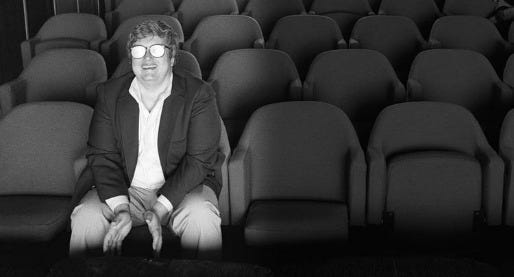Life Itself
It is a supremely satisfying full cinematic circle that Steve James has directed the documentary about the great film critic Roger Ebert, based on his autobiography, "Life Itself." After all, it was Ebert and his partner-in-snark, Gene Siskel, who first championed James' documentary, "Hoop Dreams," 20 years ago, turning it from a little-known festival entry into one of the most seminal films of the modern age.
James would not have a career, or certainly not the career he's had, without Siskel and Ebert. For more than two decades they cajoled people into loving movies while warring with each other on their iconic television show, wherein films could live or die by their up-or-down judgment.
"Two thumbs up" was their (fiercely trademarked) journalistic blessing every Hollywood producer wanted to see on the poster of their flick, while "Two thumbs down" could mark the kiss of death. Ebert and Siskel, otherwise known as "the fat one" and "the bald one" to people who couldn't recall their names but nonetheless knew who they were, spread their passion for cinema from their Chicago empire across entire generations and geographies.
"The studios started out helping us, then hating us, then fearing us," one of the longtime producers of the show says.
This of course was back in the day when film reviewers wielded amorphous but actual power, when newspapers actively sought after and promoted local voices, when people couldn't wait to hear what "their" critic from their hometown paper had to say before plunking down cash for a ticket. Inter-city battles between critics like Ebert and Siskel were the hot sauce in the soup of a community's ongoing conversation about the arts.
Sadly, most cities today, even major metropolitan centers, cannot boast one full-time movie critic, let alone two.
"Life Itself" is a marvelous movie about a marvelous man, and one for whom James and his crew are not afraid to provide a warts-and-all portrayal. Since it's based on Ebert's own writings, many of his faults are enumerated by himself: he was an alcoholic, an egotist, womanizer and occasional bully.
But he was also a natural man of letters, the sort who could dash out a fully thought-through review in a half hour. Ridiculously prodigious — he blogged tirelessly and penned travel books, a screenplay for "Beyond the Valley of the Dolls" and even a cookbook — the words flowed out of the burly, bespectacled Ebert like water.
James' documentary satisfyingly explores every angle of Ebert's life, from the professional to the personal, the public persona of the newspaper and TV star to the private things he kept hidden.
For any erstwhile student of Ebert's history, some of the material will already be well known — such as how the Chicago Sun-Times plucked him, a cub reporter barely into his 20s who'd only been at the blue-collar tabloid a few months, to be the movie critic in 1967. This was at a time when reviewing films was seen as such an inconsequential endeavor that the rival Tribune used a revolving door of writers who all published under the same pen name.
A lot of the story, however, will be brand new and emotionally affecting to the general public, such as how low Ebert grew during his last few years, when cancer forced the removal of his jawbone and the loss of his speech, and thus his TV career. James filmed with Ebert and his wife, Chaz, for several months prior to his death in 2013, and the footage of his ordeal in hospitals and rehabilitation centers underlines his bravery in writing openly on his blog about his travails. (I felt tears welling as a nurse suctioned out his GI tube, his face wrenched in the effort to withstand it.)
Also surprising are testimonials from filmmakers, unknown ones but also giants like Werner Herzog, who talk about how Ebert's championing their work made a difference in their careers. Martin Scorsese (who is also a producer) says that he was essentially washed up in the 1980s until Siskel and Ebert hosted a tribute to him at the Toronto Film Festival. He says it gave him the strength to go on — nonetheless, they savaged his next effort, "The Color of Money," something Scorsese talks about without malice.
James also includes extended discussions on the rivalry between Ebert and Siskel, which brought out the best and worst in each man. Other notable critics, like Richard Corliss of Time magazine or The New York Times' A.O. Scott, weigh in with their thoughts on how Ebert's TV work and friendships with filmmakers affected his place in the professional pantheon.
(Full disclosure: Like many established and aspiring movie critics, I enjoyed a correspondence with Ebert some years ago, when he gave me some career advice, and I had the pleasure of meeting him once in person.)
Finally, there is the tender story of Ebert's late-in-life romantic blossoming, marrying Chaz at the age of 50 and expanding his lifetime of bachelorhood into an instant extended multicultural family of children and grandchildren.
Love, laughter, tragic flaws, exotic locales, antagonists who become friends, losing the ability to speak but finding a voice — Roger Ebert's life has all the ingredients for a great movie. And "Life Itself" is that movie.



